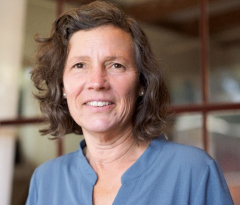Editor’s Note: Following is an email from Professor Jennifer Freyd with her reflections on a recent significant ruling on her pay equity case, which has been supported by AAUW’s Legal Advocacy Fund. The attached analyses she refers to are not included in this posting. Contact us if you would like to request a copy of them.
Dear Friends,

UO Professor Emerit Jennifer Freyd
On Monday March 15, I and others shared the news that the Ninth Circuit had ruled in favor of my appeal on a pay equity case that day. Since that time there has been some press including several in-depth articles in both Oregon and legal news venues and, among the shorter articles, one that went out via AP News (and was picked up by many papers all over the country). Between these various articles and word of mouth, we have been hearing from many lawyers and advocates, including an appellate lawyer of the US EEOC, expressing interest in the case. The tone of the messages has been positive, conveying the opinion that this Ninth Circuit decision will be very good for pay equity efforts. That means a lot to me.
The full Ninth Circuit still has many Obama and Clinton appointees (and I believe they still constitute a slight majority) but Trump did get many appointees (and thus the Ninth Circuit is not as liberal now as it was). Nonetheless, legal observers have told me the UO was very lucky in the 3-judge panel from the Ninth Circuit selected to hear my appeal — two Bush appointees and one Trump appointee from the Ninth Circuit. We had an uphill battle but we did it – with the Trump appointee dissenting. So many were involved in this effort and I’m very grateful.
The majority on the panel (that is, the two Bush appointees) note that “the granularity with which the dissent picks through the facts would gut the Equal Pay Act for all but the most perfunctory of tasks.” (This quote is from Page 22 of the Opinion – I added the bold.) We got the green light for pursuing both the federal and Oregon EPA laws. I am so relieved that the “different jobs” argument of the UO, district court, and the Trump appointee in the Ninth did not ultimately prevail. This is one of the important aspects of the case for other women faculty and professionals pursuing pay equity in the courts
The Ninth Circuit also lets us pursue the disparate impact argument from Title VII – this is important as it addresses the practice of giving raises to those (disproportionately men) who successfully negotiate retention offers without then adjusting the salary of others (disproportionately women) who are doing as much (or more) work and doing it just as well (or better). Regarding this, the Trump-appointed judge argues that now “universities in the Ninth Circuit will be unable to compete economically to retain their best professors, and we could see a corresponding brain drain in universities in the western states.” Echoing this, the UO issued a statement this week that the issues in my case, “place the ability of universities to retain faculty in question.” This is puzzling as our actual position is accurately stated in the Opinion as: “Freyd challenged a specific employment practice of awarding retention raises without also increasing the salaries of other professors of comparable merit and seniority.” Of great concern to me, the UO’s statement seems to imply that the university believes that only through discriminatory labor practices can the UO have excellence and succeed financially.
So what happens next? Our appeal was regarding the district court’s summary judgment which would have denied me a day in court. Now we have a decision that lets us go to trial — unless that decision is successfully appealed. My understanding is that we should know pretty soon whether the UO intends to appeal this appeal. I have been informed that they have two options for that. One is going back to the Ninth Circuit requesting an en banc rehearing. The other is to request a US Supreme Court opinion. There is no guarantee such appeal requests would be heard, nor of course do we know the outcome if they are heard. If the UO does not appeal, or if their attempts to appeal are not successful, then the case will be returned to the district court for a trial.
I filed the lawsuit in early 2017 after three years of trying to get an internal correction. This is such a slow process. In the meantime the UO psychology department’s salary spread seems to have only become worse. I am attaching two recent equity analyses (the first written by the dept head in December 2020, the second from March 2021 written-by a small committee I served on prior to retirement) that were distributed to the UO psychology department faculty for your information. I look at those graphs, knowing this is happening all over the country, and feel sure that I cannot accept the status quo for my colleagues, my students current and former, for my daughter, or for the world.
If you want to read more about the case and the issues it addresses (issues like whether each professor is so unique that the Pay Equity Act does not apply — something the UO argued and the district court held but the Ninth Circuit rejected — or whether success negotiating raises is a legitimate reason that men are paid more than women), I recommend three articles. The first was published in Oregon’s major newspaper and is written for a general public. The second two were published in legal analysis sources and were written for lawyers and employers. All 3 have some interesting facts and analyses.
1. Federal appeals court revives UO professor’s suit alleging ‘glaring’ pay gap between her and male counterparts, by Maxine Bernstein, The Oregonian, 17 March 2021.
2. Recent Ninth Circuit Equal Pay Act Decision A Reminder To Examine and Eliminate Gender-Based Pay Disparity (US), The National Law Review, Volume XI, Number 76, 17 March 2021.
3. Should I Stay or Should I Go? Ninth Circuit Finds Gender Discrimination in Retention Raise by J. William Manuel & Anne Yuengert, JDSupra, 17 March 2021.
Take Care,
Jennifer
Jennifer J. Freyd, PhD
Founder and President, Center for Institutional Courage
Professor Emerit of Psychology, University of Oregon
Affiliated Faculty, Women’s Leadership Lab, Stanford University
Editor, Journal of Trauma & Dissociation
